

Search Smartraveller

Latest update
Exercise a high degree of caution in China overall.
Other levels apply in some areas.
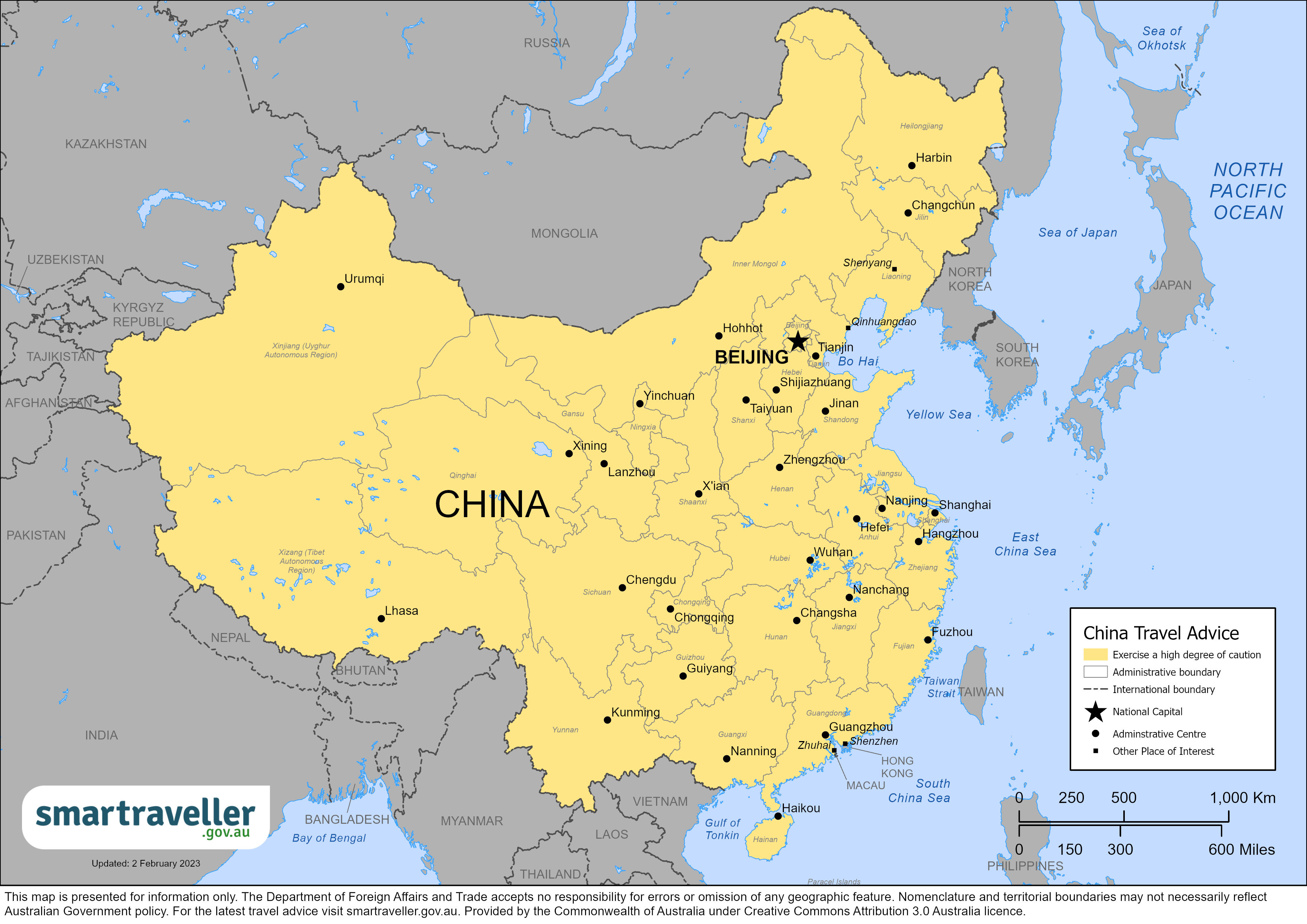
China (PDF 1.07 MB)
Asia (PDF 2.21 MB)
Local emergency contacts
Fire and rescue services, medical emergencies, advice levels.
Exercise a high degree of caution in China overall.
Exercise a high degree of caution in Tibet and Xinjiang.
Exercise a high degree of caution in Tibet and Xinjiang due to the security situation and associated measures.
- Petty crime occurs. Criminals target travellers in crowded areas, including on public transport. Resisting can lead to violence.
- Scams targeting travellers can lead to loss of money, violence and serious assault. Report scams to the nearest police station.
- Armed attacks are a risk in remote border regions. Be careful if travelling in these areas.
- The Chinese Government strictly controls demonstrations. Authorities may arrest protesters. Avoid protests and large gatherings. Don't photograph or video protests.
- Increased security measures are in place in Xinjiang. Be ready to show photo ID if asked.
- There's civil unrest and political tension in Tibet. Get permission from Chinese authorities before you go. You can only travel to Tibet as part of an organised tour.
Full travel advice: Safety
- Tap water in China may not be safe to drink. Drink only bottled water with intact seals.
- People have died from bird flu in China. Stay away from live poultry. When preparing food, handle poultry properly and ensure it's thoroughly cooked.
- HIV/AIDS is a significant risk in China. Take precautions if engaging in activities that expose you to the risk of infection. Ask for sterilised equipment when receiving medical treatment.
- Animal and human rabies and hand, foot and mouth disease are common. Be careful with both wild and domestic animals in China. Wash your hands carefully and regularly. Take other hygiene precautions.
- High pollution levels are a problem in major cities. Follow the advice from local authorities on days with harmful pollution.
Full travel advice: Health
- The Australian Government can't intervene in the Chinese justice process. We also can't help if you're a dual national and don't enter China on your Australian passport.
- Chinese law treats a person aged 12 years and older as an adult. China has strict laws and severe criminal punishments including the death penalty and life imprisonment.
- You must always carry identification and show it to the police if they ask.
- Chinese authorities undertake random drug testing on foreign nationals and can prosecute individuals who return a positive test result regardless of when or where the drugs were taken .
- Many business and employment issues may be considered criminal matters in China. Penalties are severe. Get professional legal advice before entering into any employment or commercial contract in China.
- If you're a former Chinese citizen, authorities may treat you as a citizen and refuse access to Australian consular services. Get legal advice if you're unsure of your citizenship status under Chinese law.
Full travel advice: Local laws
- Entry and exit conditions can change at short notice. You should contact the nearest embassy or consulate of China for the latest details.
- China is gradually reintroducing visas on arrival, including transit visas. You may be permitted to enter China if you’re a foreign national holding a valid residence permit for work, personal matters or reunion. Australians should also contact the nearest Chinese embassy or consulate to confirm visa validity and eligibility, and other travel requirements.
Flights between China and Australia have increased but are less frequent than pre-COVID-19.
- China has implemented random COVID-19 testing for inbound travellers arriving at airports. Authorities have advised that no follow-up action will be taken if travellers test positive on arrival, but they may be advised to seek medical treatment.
- You must register your place of residence with the local Public Security Bureau. This will be part of the standard check-in process if you stay at a hotel.
Full travel advice: Travel
Local contacts
- The Consular Services Charter tells you what the Australian Government can and can't do to help when you're overseas.
- For consular services in China, contact the Australian Embassy in Beijing or our Consulates-General in Shanghai , Guangzhou, Chengdu , and Shenyang .
- To stay up to date with local information, follow the Embassy's social media accounts.
Full travel advice: Local contacts
Full advice
Petty crime.
Petty crime occurs, including:
- pickpocketing
- bag-snatching
- theft of laptops, passports and mobile phones
If you resist, you can be injured if criminals turn violent.
Criminals target travellers in crowded areas, including on transport.
People have reported assaults and robberies , particularly in areas popular with expats. This includes bar and shopping precincts in major cities .
There are scams that target travellers.
Scammers invite travellers for a massage, teahouse service, or nearby cafes and bars. They offer various reasons and may say they wish 'to practise their English'.
Afterwards, they present travellers with an inflated bill. They won't let the traveller leave until they pay the bill by credit card.
Sometimes travellers are asked to carry concealed drugs out of China.
Never carry parcels or luggage for others.
Always pack your own bags.
ATM scams occur. Sometimes scammers set up fake ATMs that take the user's card.
Only use ATMs inside a secure place such as a bank or shopping centre. Do this during daylight hours.
If you're the victim of a crime or scam, report it to the nearest police station immediately.
Always obtain a police report when reporting a crime.
Fake money scams
Be careful of scams if paying a taxi fare with a RMB100 note. The taxi driver may swap the note for a fake note. They will then return the fake note and refuse to accept it as payment because it’s counterfeit.
Armed bandit attacks are a risk in remote areas bordering:
Be careful if travelling in these areas.
Cyber security
You may be at risk of cyber-based threats during overseas travel to any country. Digital identity theft is a growing concern. Your devices and personal data can be compromised, especially if you’re connecting to Wi-Fi, using or connecting to shared or public computers, or to Bluetooth.
Social media can also be risky in destinations where there are social or political tensions, or laws that may seem unreasonable by Australian standards. Travellers have been arrested for things they have said on social media. Don't comment on local or political events on your social media.
More information:
- Cyber security when travelling overseas
Civil unrest and political tension
Public protests and events that draw large groups of people can turn violent.
The Chinese Government prohibits demonstrations they haven't approved. Authorities may arrest protesters.
Avoid protests, demonstrations and large gatherings.
Don't photograph, film or participate in protests or other acts that authorities may consider provocative.
- Demonstrations and civil unrest
Xinjiang Uyghur Autonomous Region (Xinjiang)
Increased security measures are in place in Xinjiang.
People of Uyghur descent are particularly affected.
Security checks in major cities in Xinjiang are common. Be ready to show photo ID if asked.
Violent incidents causing deaths and injuries have occurred across Xinjiang.
The government may restrict movement and communications in Xinjiang with little warning.
Tibet Autonomous Region (Tibet)
In the past, protests have turned violent and people have been killed or injured.
If you're travelling to Tibet, get permission from Chinese authorities first.
You must also apply for a Tibet Entry Permit from the Tibet Tourism Bureau.
You can only lodge applications for Tibet Entry Permits through specialised travel agents in China.
You can only travel as part of an organised tour.
See Travel
Terrorism is a threat worldwide.
Attacks could be targeted or random. They may include places travellers and expats visit.
In recent years, terrorist and other violent attacks have caused injuries and deaths in public places. Targets include railway stations and markets.
You could become the victim of violence directed at others.
Climate and natural disasters
China experiences natural disasters and severe weather , including:
- earthquakes
Typhoons can happen along the southern and eastern coasts between May and November.
The direction and strength of typhoons can change with little warning.
If there's a typhoon:
- you may get stuck in the area
- flights and other transport could be delayed or suspended
- access to seaports may be affected
- adequate shelter may not be available
- available transport may fill quickly
If a typhoon is approaching:
- know the evacuation plan for your accommodation or cruise ship
- identify your local shelter
- secure your passport in a safe, waterproof location
- closely monitor alerts and advice from authorities such as the Global Disaster Alert and Coordination System
- keep in contact with your friends and family
If you plan to travel, contact your airline for the latest flight information.
- World Meteorological Organisation Severe Weather Information Centre
- China Meteorological Administration
Earthquakes and tsunamis
China can experience earthquakes and large, destructive tsunamis.
If there's an earthquake or tsunami:
- follow the advice of local authorities
- monitor the media for updates
Check with the Tsunami Warning Centre for updates on seismic activity and tsunamis.
If you're near the coast, move to high ground straight away if advised, or if you:
- feel a strong earthquake that makes it hard to stand up
- feel a weak, rolling earthquake that lasts a minute or more
- see a sudden rise or fall in sea level
- hear loud and unusual noises from the sea
Don't wait for official warnings such as alarms or sirens. Once on high ground, monitor local media.
Travel insurance
Get comprehensive travel insurance before you travel.
Your policy needs to cover all overseas medical costs, including medical evacuation. The Australian Government won't pay for these costs.
If you can't afford travel insurance, you can't afford to travel. This applies to everyone, no matter how healthy and fit you are.
If you're not insured, you may have to pay many thousands of dollars up-front for medical care.
- what activities and care your policy covers
- that your insurance covers you for the whole time you'll be away
Physical and mental health
Consider your physical and mental health before you travel, especially if you have an existing medical condition.
See your doctor or travel clinic to:
- have a basic health check-up
- ask if your travel plans may affect your health
- plan any vaccinations you need
Do this at least 8 weeks before you leave.
If you have immediate concerns for your welfare or the welfare of another Australian, call the 24-hour Consular Emergency Centre on +61 2 6261 3305 or contact your nearest Australian Embassy, High Commission or Consulate to discuss counselling hotlines and services available in your location.
- General health advice
- Healthy holiday tips (Healthdirect Australia)
Medications
Not all medication available over the counter or by prescription in Australia is available in other countries. Some may even be considered illegal or a controlled substance, even if prescribed by an Australian doctor.
If you plan to bring medication, check if it's legal in China. Take enough legal medicine for your trip.
Carry a copy of your prescription or a letter from your doctor stating:
- what the medication is
- your required dosage
- that it's for personal use
Health risks
Depending on your location, tap water in China may be unsafe to drink.
Drink only bottled water with sealed lids.
Bird flu (avian influenza)
People have died from avian influenza in China. Avian influenza virus strains continue to circulate in poultry in China.
The primary source of infection seems to be poultry handled in poultry markets.
To protect yourself from avian influenza:
- stay away from live poultry
- don't visit live bird and animal markets, including 'wet' markets and poultry farms
- practise good personal hygiene
When preparing food, handle poultry properly. Thoroughly cook all parts of the poultry.
- Avian influenza (WHO)
- Infectious diseases
HIV/AIDS is a significant risk in China.
Take precautions if you engage in activities that expose you to the risk of infection.
If you need medical treatment, you could be exposed to unsafe blood and blood products. This is a particular risk in regional China.
Ask for sterilised equipment. You may need to pay for new syringes in hospitals or clinics.
Insect-borne illnesses
Japanese encephalitis is widespread in rural southern China from June to August. The disease is also known as encephalitis B. A vaccine is available.
The risk of malaria increases during warm weather and is more significant in rural areas, particularly in the provinces of:
- Tibet (Zanbo Valley areas only)
Dengue cases have risen sharply, especially in Guangdong and Guangzhou. Risks increase during the wet season.
To protect yourself from disease:
- make sure your accommodation is insect-proof
- use insect repellent
- wear long, loose, light-coloured clothing
- consider taking medicine to prevent malaria
- get vaccinated against Japanese encephalitis
Animal and human rabies are common. Health authorities report many cases each year.
Be careful with both wild and domestic animals in China.
If you're bitten or scratched by an animal, get medical help immediately.
Hand, foot and mouth disease
Hand, foot and mouth disease (HFMD) is common. Sometimes serious outbreaks happen.
Outbreaks usually start in March or April and peak in May. However, outbreaks can continue until October each year.
The disease mainly affects children under the age of 10 years. Adult cases, particularly in young adults, are not unusual.
People with HFMD experience fever, blisters and rashes on the hands, feet and buttocks.
The disease is spread by direct contact with nose and throat discharges and faeces of infected people.
To protect yourself from illness:
- wash your hands carefully and regularly
- take other hygiene precautions
High pollution levels are a problem.
Children, the elderly and those with pre-existing heart and lung conditions may be especially affected by pollution.
Authorities issue red alerts when pollution is expected to be especially bad.
When a red alert is in place, authorities:
- close schools
- limit car use
- suspend construction activity
Flights are regularly delayed in China because of smog.
Dust storms occur across the north of China. They can:
- cause eye, nose, mouth and throat irritations
- make heart and lung problems worse
Get medical advice if you're worried about air pollution.
Follow the advice from local authorities about days with bad pollution and how to reduce your exposure.
- Air Quality Index
- US Embassy, Beijing
- Air pollution
Altitude sickness
Parts of China are at altitudes of over 3,000m, including:
- parts of Xinjiang
- Western Sichuan
If you travel to those areas, you may get altitude sickness .
People with lung, heart or chest problems should take extra care. Even if you're healthy, you can still be affected.
Symptoms of altitude sickness include:
- coordination problems
In severe cases, fluid can build up in your lungs, brain or both, which can be fatal.
To protect yourself from altitude sickness:
- ascend slowly, especially above an altitude of 2500m
- rest when needed and don't push your body
- avoid alcohol and cigarettes
If you're affected by severe altitude sickness, get to lower ground as soon as possible.
Medical care
Medical facilities.
International standard medical services in China are expensive.
If you plan on staying in China for a while:
- find out about local health insurance
- ask your employer if they provide health cover
Some hospitals in major cities have special departments for treating foreigners.
However, the standard of medical care and the range of medications is often limited, especially outside major cities.
Medical staff in rural areas may not be adequately trained.
Hospitals and doctors may ask for an up-front cash payment before treating you. This includes emergency care.
Medical evacuation from China can be very expensive.
Medical tourism
Travel to China for medical treatment is increasing.
Research and choose your medical service providers carefully. Ask health professionals and former patients about the quality.
Avoid uncertified medical service providers. Their standards may be poor, and they may be unable to provide the advertised medical care.
You're subject to all local laws and penalties, including those that may appear harsh by Australian standards. Research local laws before travelling.
If you're arrested or jailed, the Australian Government will do what it can to help you under our Consular Services Charter . But we can't get you out of trouble or out of jail.
The Australian Government can't intervene in the Chinese justice process.
In China, authorities treat a person aged 12 years and above as an adult under the law.
If detained, a person of this age will be:
- held with adults
- subject to the same conditions and legal processes as adults
The Australian Government can't help you if you're a dual national and you travel on your:
- Chinese passport
- Hong Kong or Macau Mainland Travel Permit
- identity card issued by Taiwan
- any non-Australian foreign passport
- Death penalty
China has the death penalty for drug offences, and other serious crimes.
If you're sentenced to death, it's unlikely that Chinese authorities will grant you leniency.
Penalties for all types of drug offences including use, possession, manufacturing, selling or trafficking are severe and include life in prison or the death penalty.
Authorities strictly enforce these laws, even for small quantities of 'soft' drugs, such as marijuana. Laws apply to people aged 12 years and older.
Authorities conduct random drug tests. Police raids on nightclubs and bars frequented by foreigners have increased, with patrons subjected to urine and / or hair tests. A positive drug test can result in fines, detention and deportation, regardless of when or where the drugs were used.
Authorities have executed foreigners for drug offences.
- Carrying or using drugs
Legal proceedings and investigations
Authorities may not allow you to leave China if you're involved in a:
- criminal matter or investigation
- civil or commercial dispute
Sometimes people are only aware of an exit ban on them once they try to leave China.
Exit bans can affect you even if you're not directly involved in the legal proceedings. Authorities have stopped some Australians from leaving China because of a dispute involving family members. Sometimes it is years before authorities allow people to leave China.
If you're involved in local legal matters:
- get professional advice
- be aware of your rights and responsibilities
China has strict laws on national security, which it updates from time to time. These laws can be interpreted broadly and applied expansively and harshly. Chinese authorities may define certain behaviours and activities as endangering national security that would not be considered as such in Australia. This could include activities that occurred outside of China.
Authorities have detained foreigners on allegations of 'endangering national security'. Australians may be at risk of arbitrary detention or harsh enforcement of local laws, including broadly defined National Security Laws.
In China, it's illegal to:
- test positive for drugs (even if you used drugs before you arrived in China)
- demonstrate without prior approval from the government
- preach, distribute religious literature and associate with unapproved religious groups
- take part in any Falun Gong activities
- gamble or promote gambling activities
- engage in prostitution
- take photos of military or government buildings without official approval.
If you break these laws, you could be:
Registration and identification
Under Chinese law, you must register your place of residence with the local Public Security Bureau. You must do this within 24 hours of arriving and each time you change your residential location.
Staff do this as part of the standard check-in process if you stay at a hotel.
If you're staying elsewhere, such as with family or friends, visit the nearest police station. Present your passport and a valid Chinese visa.
You must always carry identification and show it to the police if they ask for it.
Authorities will accept your passport or a Chinese residence card as forms of identity.
If you don't register your place of residence or carry identification, authorities can fine or detain you.
Homosexuality is not illegal in China but be aware of local sensitivities.
- Advice for LGBTI travellers
Australian laws
Some Australian criminal laws still apply when you're overseas. If you break these laws, you may face prosecution in Australia.
- Staying within the law
- Doing business in China
China has experienced higher numbers of commercial disputes involving Australians in recent years.
Before starting business relationships:
- investigate the market
- conduct appropriate due diligence
Get professional legal advice before entering into any contract in China. This includes residential leases and business contracts.
Business versus criminal matters
Many business issues Australians consider civil or commercial are classified as criminal matters in China. This is especially the case if state enterprises or state assets are involved.
Penalties for commercial and economic crimes are often severe.
Cases of Australians and other foreigners being held against their will at their workplace have increased. These incidents involved other companies or employees trying to resolve business and employment disputes. They do this through protests, and often with threats of violence.
- Doing business
- Living or working overseas
Employment in China
Disputes over working and living conditions for Australians working in China are common. This is particularly the case for those teaching English.
If you’re considering travel to China for work:
- verify the true nature of the work on offer
- make sure you have the correct visa before you arrive
Authorities can fine or detain you if you don't maintain a valid visa.
Get professional legal advice before signing any contract in Australia or China.
Carefully check local laws about business or other activities you wish to undertake in China.
Employment contracts may contain conditions that disadvantage you. For example, if your contract is terminated early, conditions may state that:
- you give up your right to a return air ticket
- your employer may withhold your pay
Don't surrender your passport to your employer for 'safe-keeping.' Businesses with a good reputation won't ask you to do this.
Dual citizenship
The Chinese Government doesn't recognise dual nationality. It won't let us provide consular help to Chinese-Australian dual nationals who travel on their:
If you're a Chinese-Australian dual national:
- travel on your Australian passport
- get a visa to China
- always present yourself as an Australian citizen
If you're a former Chinese citizen, Chinese authorities may:
- treat you as a Chinese citizen
- refuse you access to Australian consular services
This can happen even if you entered China on an Australian or other foreign passport and you:
- haven't renounced your citizenship according to Chinese law
- haven't formally advised the Chinese authorities of your Australian citizenship
- continue to maintain a Chinese passport or household registration
Authorities may not allow certain categories of Chinese citizens, such as state officials, to renounce their Chinese nationality under Chinese law.
Get professional legal advice if you're unsure of your citizenship status under Chinese law.
If your child is born in China and you plan to get Australian citizenship by descent, contact the Australian Department of Home Affairs for advice.
If one parent is from mainland China, authorities will consider a child born in China to be a Chinese national.
Local authorities may not recognise the child's Australian citizenship and passport.
Contact the local Entry and Exit Administration Bureau for details.
- Dual nationals
Visas and border measures
Every country or territory decides who can enter or leave through its borders. For specific information about the evidence you'll need to enter a foreign destination, check with the nearest embassy, consulate or immigration department of the destination you're entering.
Australians intending to travel to China should contact the nearest Chinese embassy/consulate to confirm visa eligibility and other travel requirements.
China is gradually reintroducing visas on arrival, including transit visas. You may need a full visa to travel to China, even as a tourist.
If you need a full visa, you must get this before you travel.
See the Embassy of the People's Republic of China for eligibility requirements and visa types.
Foreigners holding valid Chinese residence permits for work, personal matters and reunion may be able to enter China without applying for new visas. Contact your nearest Chinese embassy/consulate to confirm your visa remains valid or to apply for a new visa.
If you're already travelling or living in China, contact the Foreigner's Entry and Exit Administration Section of the local Public Security Bureau (PSB) for visa information.
Authorities will scan your fingerprints when you arrive if you're aged between 14 and 70 years.
Authorities have strict penalties for visa violations. Penalties include:
- fines imposed for each day overstayed, including if you’re in detention
- detention from 5 to 30 days
Make sure you leave China before your visa expires.
Entry and exit conditions can change at short notice. Contact the nearest embassy or consulate of China for details about visas, currency, customs and quarantine rules.
Border measures
You no longer require a negative COVID-19 test to enter China.
China has implemented random COVID-19 testing for inbound travellers arriving at airports. Authorities have advised that no follow-up action would be taken if travellers test positive on arrival, but they may be advised to seek medical treatment.
Travel to Hong Kong and Macau
Hong Kong and Macau are Special Administrative Regions (SAR). They have separate visa and entry rules to mainland China.
If you plan to leave mainland China to visit Hong Kong or Macau, you may need a new Chinese visa to re-enter mainland China. Get the correct visa before you leave Australia.
You may be asked to present your previous passport and Chinese visa if you:
- intend to apply for a visa at the border of Shenzhen and Hong Kong, or Zhuhai and Macau, and
- you held a Chinese visa in a recently replaced passport
If you've visited China before, authorities may deny you a visa-on-arrival if you can't show your previous China visa.
Some visas issued in Hong Kong or at Hong Kong-Macau-Chinese mainland border crossings are valid for limited travel to designated areas only, such as:
- other areas in Guangdong Province
Using these permits to travel to other parts of China is illegal. Carefully check your visa limitations.
- Hong Kong travel advice
- Macau travel advice
Other formalities
If you’re a parent of a newborn baby born in China, you must register the child with the local Public Security Bureau. You must do this within 30 days of the child's birth and will require the child’s birth certificate for registration .
Apply for a Chinese visa in the child's passport. The child will need a valid visa to leave China.
For the registration process you need:
- the child's birth certificate
- parents' passports
- child's passport
For citizenship issues, see the 'Dual citizenship' section under Laws .
Some countries will only let you enter if your passport is valid for 6 months after you plan to leave that country. This can apply even if you're transiting or stopping over.
Some foreign governments and airlines apply the rule inconsistently. Travellers can receive conflicting advice from different sources.
You can end up stranded if your passport is not valid for more than 6 months.
The Australian Government does not set these rules. Check your passport's expiry date before you travel. If you're not sure it'll be valid long enough, consider getting a new passport .
Lost or stolen passports
Your passport is a valuable document. It's attractive to people who may try to use your identity to commit crimes.
Some people may try to trick you into giving them your passport. Always keep it in a safe place.
If your passport is lost or stolen, tell the Australian Government as soon as possible:
- In Australia, contact the Australian Passport Information Service .
- If you're overseas, contact the nearest Australian embassy, high commission or consulate .
If you get a new passport while in China, you must get a new Chinese visa. Otherwise, you won't be able to leave China.
Chinese authorities can take up to 10 working days to issue a visa. It can take longer during Chinese holiday periods.
Authorities won't speed up the process to meet your travel or flight schedule.
To replace your passport and visa:
- get an official report from the local police
- get a replacement passport from the nearest Australian embassy, high commission or consulate
- apply at the Foreigners Entry and Exit Administration Section of the local Public Security Bureau for a replacement Chinese visa in your new passport
You can use the police report when checking in to a hotel.
Passport with ‘X’ gender identifier
Although Australian passports comply with international standards for sex and gender, we can’t guarantee that a passport showing 'X' in the sex field will be accepted for entry or transit by another country. Contact the nearest embassy or consulate of your destination before you arrive at the border to confirm if authorities will accept passports with 'X' gender markers.
- LGBTI travellers
The currency in China is the Renminbi (RMB).
Chinese law limits the amount of foreign currency you can carry in and out of China.
If you're carrying more than $US5,000 cash or the same amount in another currency, you must declare it when you arrive in China.
Keep the declaration. You need to show it to customs officials when you leave.
If you plan to leave China carrying more than $US5,000 or the same amount in another currency, you need permission from a Chinese bank.
You can't leave China with more than $US10,000 or the same amount in foreign currency.
ATMs are widely available in major Chinese cities. They accept all major credit cards.
Credit cards are widely accepted in major cities, especially in international hotels and restaurants.
In smaller cities, you may find it harder to use international cards.
Local travel
Authorities restrict travel by foreigners in China.
If you plan to travel outside major tourist areas, check that the area is 'open to foreigners'. For example, restrictions apply near military installations and some border areas.
Travel and living conditions vary greatly between cities and less developed rural areas.
In rural areas, you may have trouble accessing these services:
- landline phone
- mobile phone
Driving permit
All drivers must hold a valid Chinese driver's licence.
Foreign driver's licences and International Driving Permits (IDP) aren't valid in mainland China.
Long-term residents can apply for a Chinese driver's licence at their local Vehicle Management Office.
If you're going to China on a visa with less than 90 days validity, you may be able to get a provisional driver's licence. This will be valid for the length of your visa.
If you're hiring a car in China, check driving licence requirements with your car hire company.
Age and health restrictions apply and vary depending on the class of driver's licence.
Road travel
Travel by road is dangerous because of the following:
- poorly maintained roads
- aggressive driving
You're more likely to be killed in a car accident in China than in Australia.
- Driving or riding
Motorcycles
To ride a motorcycle, you must hold a valid Chinese motorcycle licence.
Australian motorcycle licences and International Driving Permits (IDP) issued for motorcycles aren't valid in mainland China.
Rules for applying for a motorbike licence, including a provisional motorcycle licence, are similar to those for cars. Contact your local Vehicle Management Office.
You don't need a licence to ride an electric bike.
Check your insurance covers you for riding all types of motorised bikes.
Always wear a helmet.
Use only licensed taxis or limousine services with a good reputation, preferably those arranged through your hotel.
Always insist that the meter is used.
Most taxis in China don't have seatbelts.
Taxi drivers may swap legitimate RMB100 notes for fake notes. They will then return the fake note and refuse to accept it as payment because it’s counterfeit.
Ridesharing apps are widely used in major Chinese cities.
Public transport
Tour operators, public buses and ferries might not meet safety standards, especially in rural areas.
Transport operators may not:
- provide adequate safety equipment
- maintain vehicles and equipment
- have safety precautions in place
Always use available safety equipment, such as lifejackets or seatbelts.
If appropriate safety equipment isn't available, use another provider.
- Transport and getting around safely
- Travelling by boat
Many airlines have temporarily reduced or stopped flights to China. Further travel restrictions can come into effect at short notice.
DFAT doesn't provide information on the safety of individual commercial airlines or flight paths.
Check China's air safety profile with the Aviation Safety Network.
Contact your airline or travel agent for up-to-date information on domestic and international flights and transport options.
Emergencies
Depending on what you need, contact your:
- family and friends
- travel agent
- insurance provider
Always get a police report when you report a crime.
Your insurer should have a 24-hour emergency number.
Consular contacts
Read the Consular Services Charter for what the Australian Government can and can't do to help you overseas.
For consular services in China, contact the Australian Embassy in Beijing or our Consulates-General in Shanghai, Guangzhou, Chengdu and Shenyang.
Check the relevant website for details about opening hours and any temporary closures.
Australian Embassy, Beijing
21 Dongzhimenwai Dajie Sanlitun, Chaoyang District, Beijing 100600 Phone: (+86 10) 5140 4111 Fax: (+86 10) 5140 4292 Website: china.embassy.gov.au Social media: WeChat , Twitter
Australian Consulate General, Chengdu
27th Floor, Square One 18 Dongyu Street, Jinjiang District Chengdu 610016 Phone: (+86 28) 6268 5200 Fax: (+86 28) 6268 5222 Email: [email protected] Website: chengdu.china.embassy.gov.au
Australian Consulate General, Guangzhou
12th Floor, Development Centre No. 3 Linjiang Road, Zhujiang New City Guangzhou 510623 Phone: (+86 20) 3814 0111 Fax: (+86 20) 3814 0112 Website: guangzhou.china.embassy.gov.au
Australian Consulate General, Shanghai
Level 22, CITIC Square 1168 Nanjing Xi Lu Shanghai 200041 Phone: (+86 21) 2215 5200 Fax: (+86 21) 2215 5252 Website: shanghai.china.embassy.gov.au
Australian Consulate-General, Shenyang
Level 19, China Resources Building, Tower A 286 Qingnian Avenue, Heping District, Shenyang, 110004 Phone: (+86 24) 8610 6100 Fax: (+86 24) 8163 0288 Email: [email protected] Website: shenyang.consulate.gov.au
24-hour Consular Emergency Centre
In a consular emergency, if you can't contact an embassy, call the 24-hour Consular Emergency Centre on:
- +61 2 6261 3305 from overseas
- 1300 555 135 in Australia

Travelling to China?
Sign up to get the latest travel advice updates..
Be the first to know official government advice when travelling.
Australian Government Department of Health and Aged Care
Travellers from China required to undertake COVID-19 testing before travel
The Australian Government will introduce pre-departure testing for COVID-19 for people travelling to Australia from the People’s Republic of China.
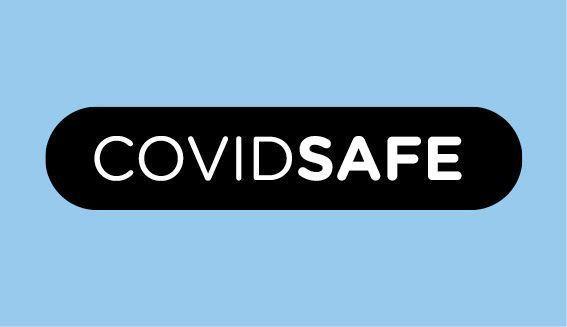
The Australian Government will introduce pre-departure testing for COVID-19 for people travelling to Australia from the People’s Republic of China including the Special Administrative Regions of Hong Kong and Macau.
This measure is in response to the significant wave of COVID-19 infections in China and the potential for emerging viral variants in that country.
From 12:01am on Thursday 5 January 2023, travellers will be required to undertake a COVID-19 test within the 48hrs prior to travel and show evidence of a negative test result when travelling to Australia.
While we are no longer in the emergency phase of the pandemic response in Australia, this decision has been made to safeguard Australia from the risk of potential new emerging variants, and in recognition of the rapidly evolving situation in China and uncertainty about emerging viral variants.
In making this decision, I have been briefed extensively by the Chief Medical Officer (CMO). Australia now joins other countries across the world including France, India, Japan, Malaysia, Spain, the Republic of Korea, England and the United States of America in implementing similar measures.
These arrangements are precautionary and temporary and will remain under review based on the health advice and available information.
My department is working with states and territories to monitor the situation in Australia very closely. In addition, the Government continues to work closely with state and territory governments to improve our capacity to detect and rapidly respond to any new emerging variants of concern.
There is no advice to change our current approach to managing this phase of the pandemic in Australia. Fortunately, in Australia we have readily available access to vaccines and treatments, and high underlying population immunity.
Every single person eligible for a COVID-19 vaccine should make an appointment as soon as they are eligible. Staying up to date with vaccinations is one of the simplest actions people can take to help protect themselves from becoming severely unwell from COVID-19. Additionally, anyone who is eligible for oral anti-viral treatments should have a plan to access those if they test positive for COVID-19.
Quotes attributable to Minister Butler:
“The decision to implement these temporary measures has been made out of an abundance of caution, taking into account the dynamic and evolving situation in China and the potential for new variants to emerge in an environment of high transmission."
“Australia is well positioned in its pandemic response. We continue to monitor the COVID-19 situation in Australia and internationally, in collaboration with medical experts. Our absolute priority is keeping our community safe and continuing to be a world leader when it comes to responding to the global COVID-19 pandemic."
“This small but sensible move will help to protect people who are at risk of severe illness and safeguard our healthcare system.”
- COVID-19 vaccines
- Coronavirus (COVID-19)
Is there anything wrong with this page?
Help us improve health.gov.au
If you would like a response please use the enquiries form instead.
Australia says no change to rules regarding travellers from China
- Medium Text
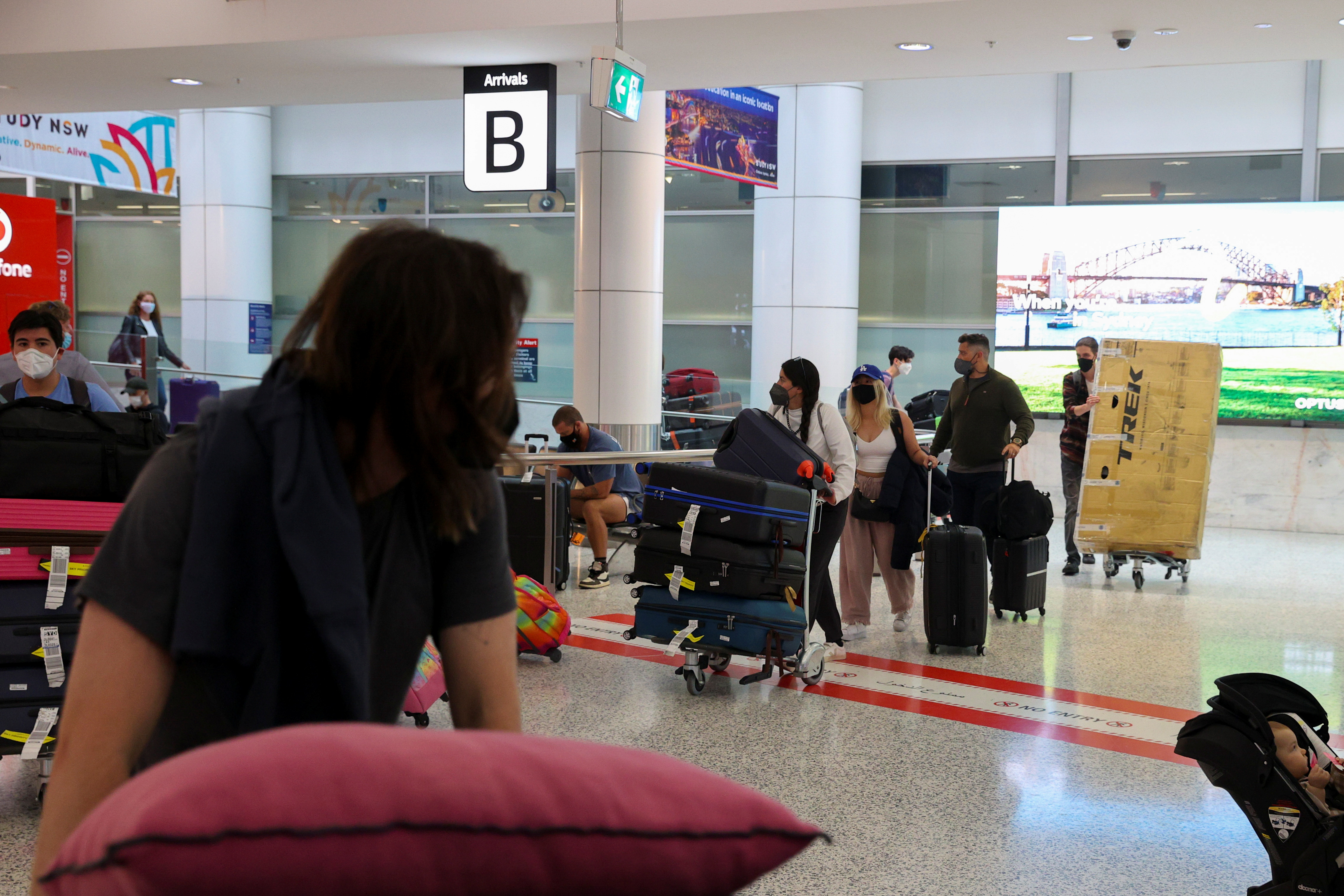
The Reuters Daily Briefing newsletter provides all the news you need to start your day. Sign up here.
Reporting by Byron Kaye Editing by Chris Reese, David Gregorio and Lincoln Feast.
Our Standards: The Thomson Reuters Trust Principles. New Tab , opens new tab
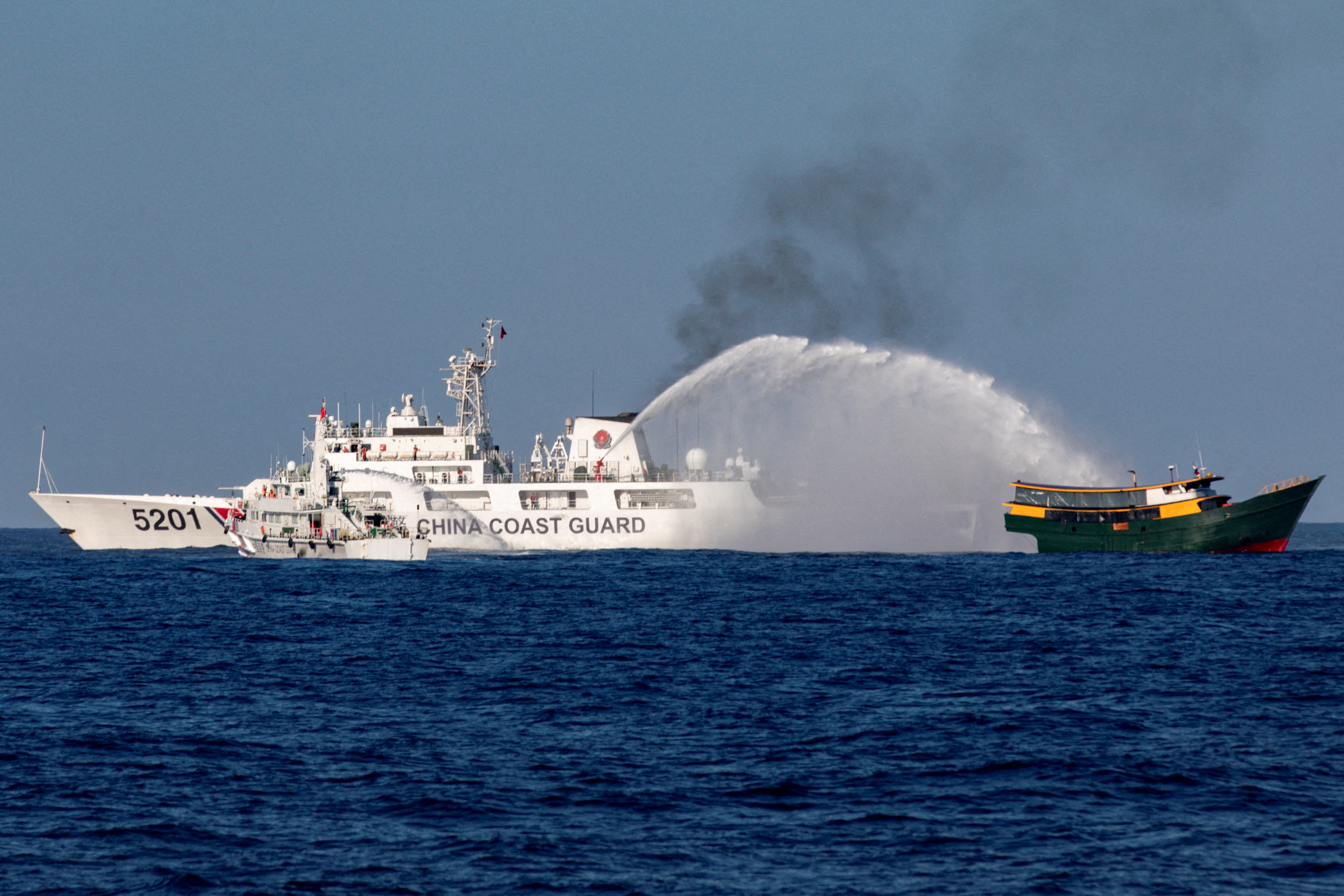
World Chevron
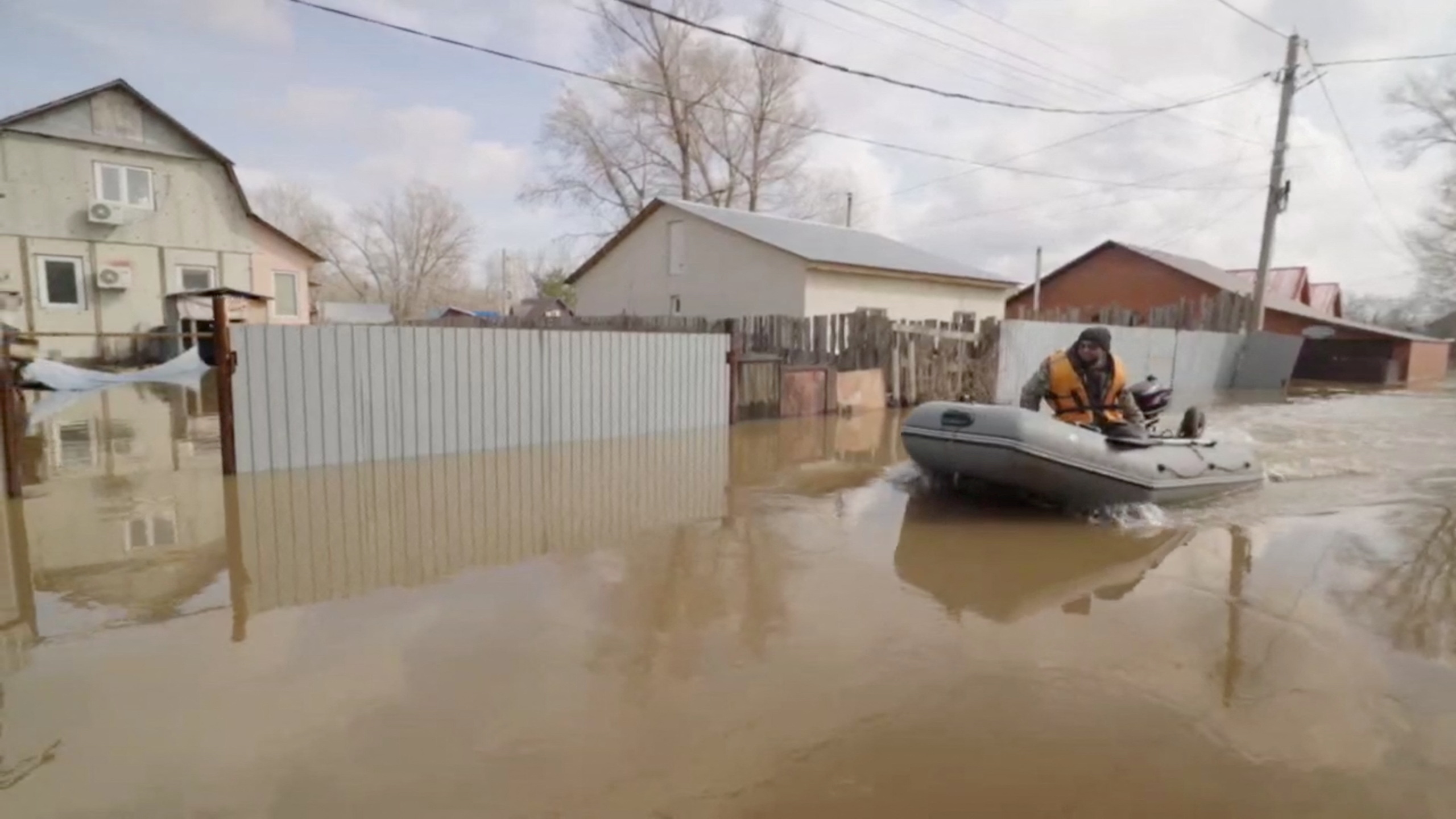
Russia, Kazakhstan evacuate over 100,000 people amid worst flooding in decades
Russia and Kazakhstan ordered more than 100,000 people to evacuate after swiftly melting snow swelled mighty rivers beyond bursting point in the worst flooding in the area for at least 70 years.

- International edition
- Australia edition
- Europe edition
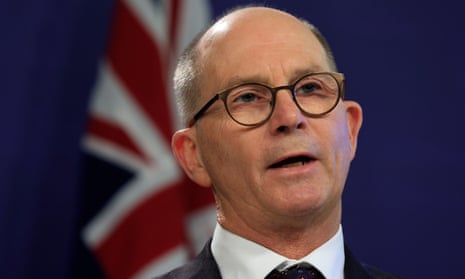
Australia imposed Covid checks on travellers from China against advice of top health official
Prof Paul Kelly told Albanese government there was not ‘sufficient public health rationale’ for additional requirements targeting China
- Follow our Australia news live blog for the latest updates
- Get our morning and afternoon news emails , free app or daily news podcast
The Albanese government imposed pre-flight Covid checks on travellers from China against the advice of the chief medical officer, Prof Paul Kelly.
The 31 December advice, published by the health department , stated that Kelly did “not believe that there is sufficient public health rationale” for any additional requirements, labelling any restriction on travel from China “disproportionate to the risk”.
Announcing the federal government’s response on Sunday , the health minister, Mark Butler, sidestepped a question about the content of health advice, saying that it confirmed Australia was “well positioned in the fight against Covid” but the pre-flight checks were being imposed “out of an abundance of caution”.
The Coalition criticised the decision on Tuesday, with the Nationals leader, David Littleproud, calling on Butler to clarify “confusion” about the advice and “make it transparently clear about what are the trigger points moving forward”.
“That’s what builds confidence,” he told Channel Nine’s Today program.
The shadow assistant minister for mental health, Melissa McIntosh, said it was “quite perplexing” that Butler had “gone against the health advice of the chief medical officer of this country”.
“One of the reasons why Australia got through the pandemic was one of the best countries in the world to do so was because we followed Australia’s medical advice,” she told ABC News Breakfast. “Not following other countries’ [advice].”
In the advice published on Sunday, Kelly states he consulted chief health officers on the Australian Health Protection Principal Committee on 30 December 2022, and there was “strong consensus that implementation of any restrictions to travel from China at this time would be inconsistent with the current national approach to the management of Covid-19 and disproportionate to the risk”.
“I do not believe that there is sufficient public health rationale to impose any restriction or additional requirements on travellers from China,” he stated.
Kelly cited Australia’s high levels of vaccination, immunity from prior infection, ready access to testing, strong surveillance mechanisms in Australia and that “the BF.7 Omicron sub-variant that appears to be a key driver to the outbreak in China has been present in Australia for some time”.
The written advice echoes comments made by Kelly on Thursday that “the variant that’s circulating mostly and driving the rising cases in China is a variant that we’ve already seen in Australia”.
Kelly also cited in the advice the fact it “is currently summer in Australia (as distinct from those countries who have chosen to implement enhanced border measures in recent days), which reduces the risk of transmission of respiratory viruses”.
“Notwithstanding, should you wish to explore in further detail the powers available to you as health minister under the Biosecurity Act 2015, I will ask that formal legal [advice] be prepared for your consideration.”
Kelly recommended greater surveillance including that the government “explore the feasibility of implementing an aircraft wastewater testing program”, a measure Butler gave the green light to on Monday.
Butler said on Sunday that he had “received written and verbal briefings from the commonwealth chief medical officer Prof Paul Kelly, about the emerging situation in China”.
after newsletter promotion
“There is a broad consensus among all of the jurisdictional chief health officers … that the resumption of travel between China and Australia poses no immediate public health threat to Australians,” he said.
Butler said the pre-flight checks were being imposed out of an “abundance of caution”, citing the concerns of the World Health Organization about a lack of detailed information regarding the Covid wave in China.
“That lack of comprehensive information has led a number of countries in recent days to put in place various measures, not to restrict travel from China, it’s important to say, but to gather better information about what is happening epidemiologically in that country,” the health minister said.
On Tuesday, Butler acknowledged on FiveAA Radio that chief health officers had advised that “the resumption of travel between China and Australia poses no public health threat to Australians” – without referring to advice against changing settings.
Butler claimed that since Kelly’s advice “we started to see a number of countries move, England and France I think within 24 hours of my announcement just as one example”, despite the fact these countries’ settings were already accounted for in Kelly’s advice.
Further details about the pre-flight testing regime, released on Monday, reveal that rapid antigen tests will be accepted but must be administered or supervised by a medical practitioner.
Travellers on flights transiting through China – including Hong Kong and Macau – but originating in other countries do not need to undertake pre-departure testing. The new regime starts on Thursday .
- Coronavirus
- Australian politics
Most viewed
- KAYAK for Business NEW
China Travel Restrictions
Traveller's COVID-19 vaccination status
Travelling from Australia to China
Open for vaccinated visitors
COVID-19 testing
Not required
Not required for vaccinated visitors
Restaurants
Recommended on public transportation.

Ready to travel?
Find flights to china, find stays in china, explore more countries on travel restrictions map, destinations you can travel to now, netherlands, new zealand, philippines, south korea, united arab emirates, united kingdom, united states, know when to go.
Sign up for email alerts as countries begin to open - choose the destinations you're interested in so you're in the know.
Can I travel to China from Australia?
Most visitors from Australia, regardless of vaccination status, can enter China.
Can I travel to China if I am vaccinated?
Fully vaccinated visitors from Australia can enter China without restrictions.
Can I travel to China without being vaccinated?
Unvaccinated visitors from Australia can enter China without restrictions.
Do I need a COVID test to enter China?
Visitors from Australia are not required to present a negative COVID-19 PCR test or antigen result upon entering China.
Can I travel to China without quarantine?
Travellers from Australia are not required to quarantine.
Do I need to wear a mask in China?
Mask usage in China is recommended on public transportation.
Are the restaurants and bars open in China?
Restaurants in China are open. Bars in China are .
- Environment
- Road to Net Zero
- Art & Design
- Film & TV
- Music & On-stage
- Pop Culture
- Fashion & Beauty
- Home & Garden
- Things to do
- Combat Sports
- Horse Racing
- Beyond the Headlines
- Trending Middle East
- Business Extra
- Culture Bites
- Year of Elections
- Pocketful of Dirhams
- Books of My Life
- Iraq: 20 Years On
Australia joins nations imposing Covid travel curbs on arrivals from China
Hospitals in parts of china are struggling to manage a surge in infections.
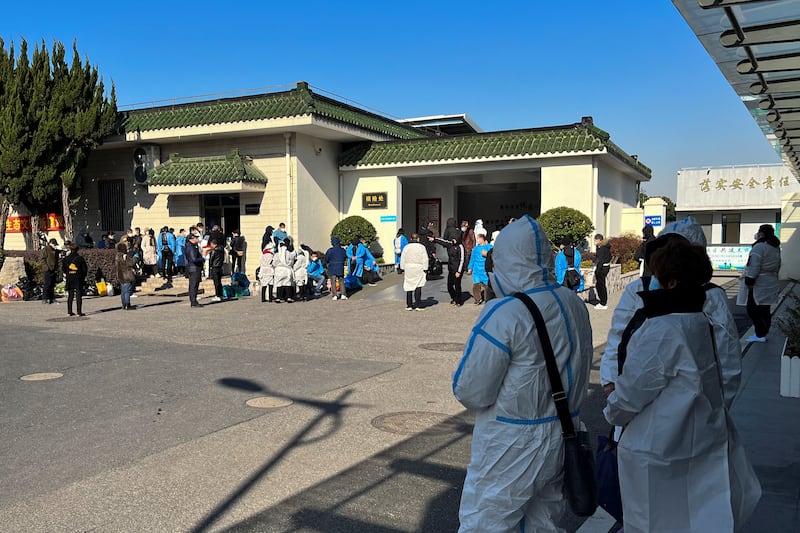
People stand outside a funeral home in Shanghai, as cases of Covid-19 surge in China. Reuters
Morocco has barred all travellers from China as more than a dozen countries have brought in travel restrictions as concern grows over its surge in Covid-19 cases.
Last month, Beijing abruptly began dismantling its "zero-Covid" containment policy of lockdowns and mass testing, three years after the coronavirus first emerged in the city of Wuhan.
As Covid-19 overwhelms Chinese hospitals and crematoriums, officials have insisted that the wave is "under control" despite acknowledging that the true scale of infections is "impossible" to track.
Covid patients fill ICUs in China's hospitals
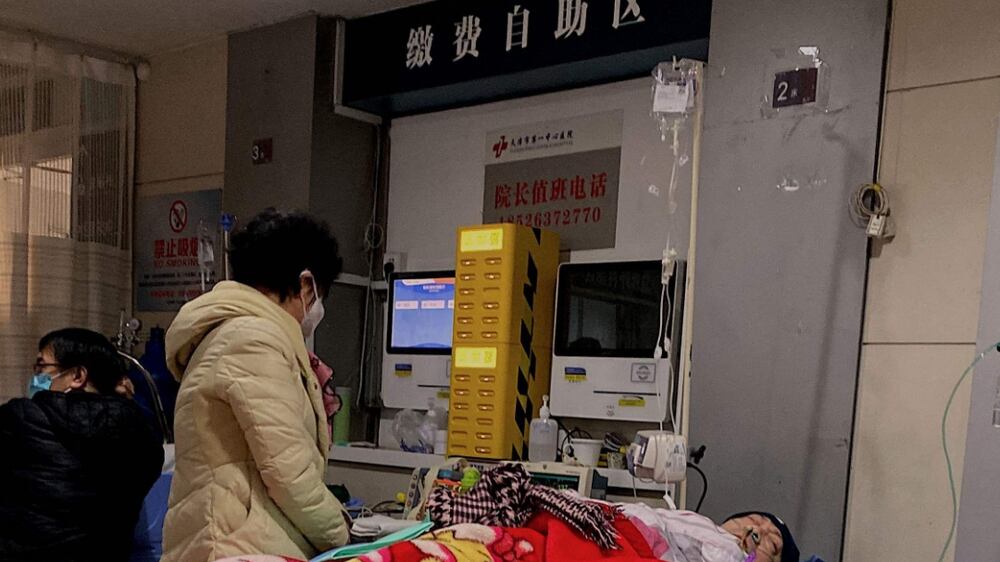
Rabat on Sunday said they would “prohibit access to the territory of the Kingdom of Morocco to all travellers, regardless of their nationality, coming from the People's Republic of China.”
The authorities added that “this exceptional measure in no way affects the sincere friendship between the two peoples nor the strategic partnership between the two countries, to which the Kingdom remains firmly attached.”
Australia's health minister on Sunday cited Beijing's "lack of comprehensive information" about Covid-19 cases as the reasoning behind the travel requirement, which will take effect on January 5. The move will "safeguard Australia from the risk of potential new emerging variants," he said.
In recent days, Canada, the US, UK, France, Italy, Spain, Japan, South Korea and Taiwan have also imposed either a negative Covid test requirement or testing upon arrival for travellers from China.
Canada cited "the limited epidemiological and viral genomic sequence data available" on recent cases in China for its negative test demand.
Meanwhile, Morocco moved to ban all arrivals from China on Saturday, "to avoid a new wave of contaminations in Morocco and all its consequences."
The flurry of global travel restrictions began as countries anticipated a surge in Chinese visitors after Beijing announced that mandatory quarantine for inbound passengers would end on January 8.
The World Health Organisation has called the precautionary measures "understandable" in light of the lack of outbreak information provided by Beijing.
But the European branch of the International Airports Council ― which represents more than 500 airports in 55 European countries ― said the restrictions were not justified or risk-based.
European countries will meet next week to discuss a joint response to the issue, with incoming EU presidency holder Sweden saying it was "seeking a common policy for the entire EU when it comes to the introduction of possible entry restrictions".
While a few major Chinese cities seem to be emerging from the current wave of infections, under-resourced smaller cities and rural areas have been hit especially hard.
In response to the outbreak, Taiwanese President Tsai Ing-wen said on Sunday that she was "willing to provide necessary assistance based on humanitarian concerns," but did not specify what kind of aid might be extended to Beijing, which considers the self-ruled island a breakaway province.
But in his televised New Year address, Chinese President Xi Jinping struck an optimistic note.
"Epidemic prevention and control is entering a new phase ... Everyone is working resolutely, and the light of hope is right in front of us," Mr Xi said, in a speech on Saturday.
Despite the jump in infections, large crowds still gathered for New Year's Eve celebrations in Shanghai and Wuhan, although some social media users said the festivities seemed more subdued than in past years.
China on Sunday reported more than 5,100 new infections and one death linked to Covid-19 out of its population of 1.4 billion ― but commentators say the figures appear to be out of step with the reality on the ground.

Traveling from Australia to China: What You Need to Know
Traveling from Australia to China is possible, but it requires planning and preparation. The two countries have different visa requirements, and travel restrictions may be in place due to the ongoing COVID-19 pandemic.
Visa requirements for China vary depending on the purpose of your trip and your nationality. Tourist visas are typically valid for 30 days and can be obtained through a Chinese embassy or consulate. Business visas are valid for up to 90 days and can be obtained through a Chinese travel agency or business sponsor. If you are planning to work or study in China, you will need a different type of visa.

In addition to visa requirements, travelers from Australia will also need to provide proof of a negative COVID-19 test taken within 48 hours of departure. This requirement is subject to change and travelers should check for the most up-to-date information before planning their trip.
Australia has also implemented travel restrictions due to the COVID-19 pandemic. As of January 2021, the Australian government has suspended all travel to China. The suspension is in place to protect Australians from the spread of COVID-19 and is subject to change. Travelers should check the Australian government’s website for the most up-to-date information.
In order to travel from Australia to China, it is important to plan ahead and research the current visa and travel restrictions in place. While it may be possible to travel between the two countries, it requires careful planning and preparation.
As restrictions and requirements change, it is important to stay informed and up to date with the most recent information before making any travel plans. It is also important to keep in mind that travel restrictions may change quickly, so travelers should check for updates regularly.
It is also recommended for travelers to have travel insurance to cover unforeseen events such as cancellation or quarantine.
Overall, while it’s possible to travel from Australia to China, it’s important to stay informed about the current restrictions and requirements in place and to plan ahead. With careful planning, you can make your trip a reality.
Leave a Comment Cancel Reply
Your email address will not be published. Required fields are marked *
Save my name, email, and website in this browser for the next time I comment.
VIDEO : Australia introduces travel restrictions for travellers from China
- X (formerly Twitter)
Passengers will now be required to present a negative COVID test to enter Australia, as concerns mount over China's massive COVID surge.
Stories from ABC News
Anthony albanese urges israel to avoid ground invasion of rafah.
David Johnston named new chief of defence force
Millions witness rare total solar eclipse across North America
Consumers furious as energy companies charge time-of-use tariffs
Questionable billing by doctors rife in Australia
- Travel Deals
Qantas discounts 100 routes in 72-hour sale
Qantas has announced a snap sale on its domestic network with the cheapest route starting at $105.

Qantas slashes fares to popular destination
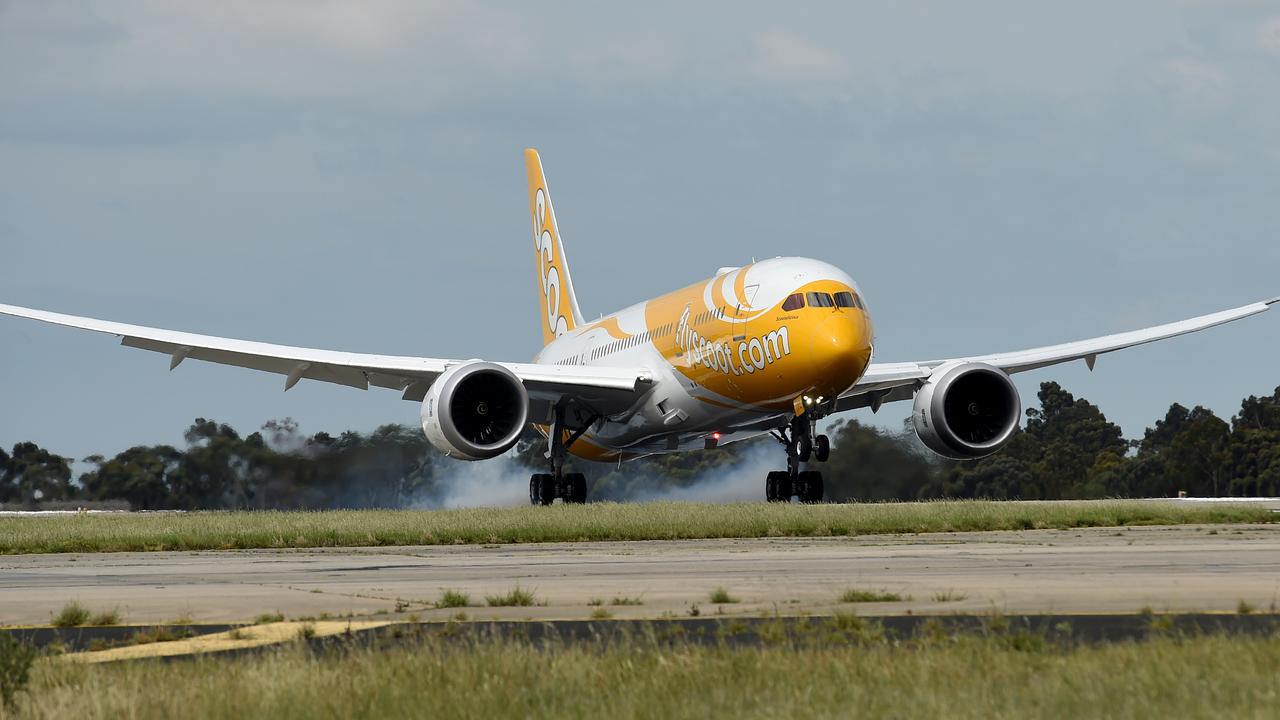
Scoot launch $355 Aussie fares to Europe
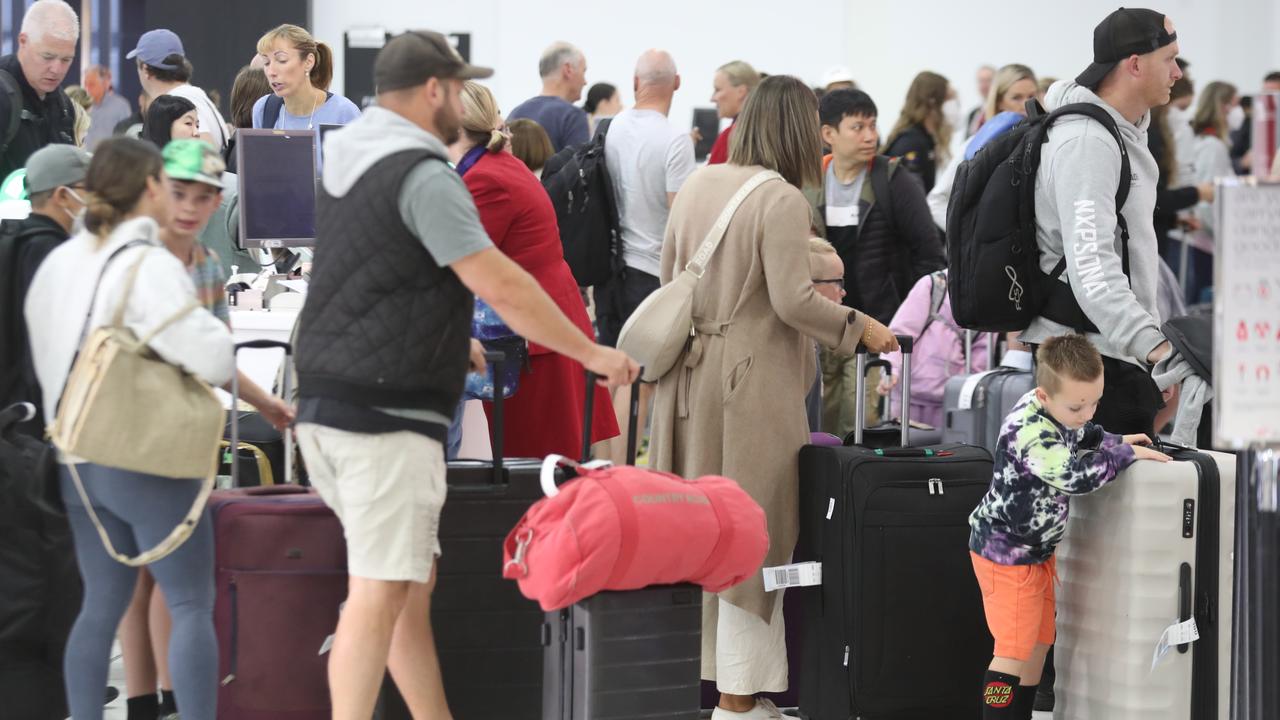
Day you don’t want to fly this Easter
Qantas has opened a quickfire three-day sale on 100 domestic routes a day after a new offering for high-rolling frequent flyers.
From Tuesday until Friday, people can book one-way tickets on one of more than 30 routes for less than $150.
Bookings can be made for May to December. The airlines says the sale offers discounts on more than one million seats.
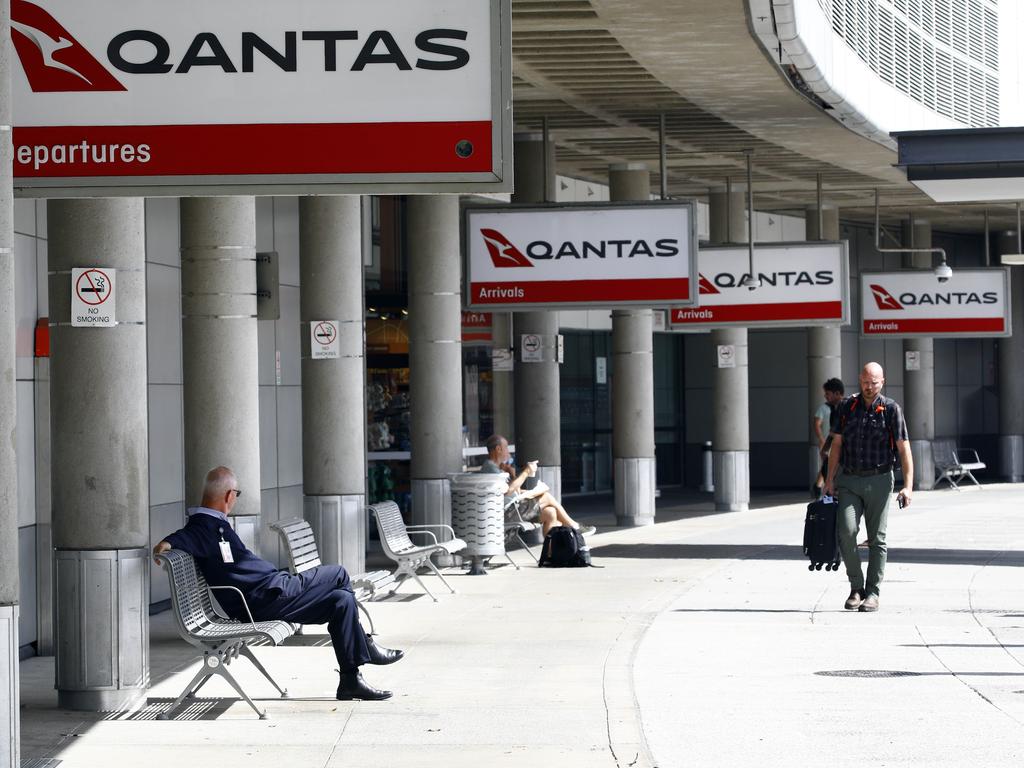
More than 100 routes are on sale, including Launceston to Melbourne ($105), Ballina to Sydney ($1190, Sydney to Gold Coast ($129), Proserpine to Brisbane ($129), Hobart to Melbourne ($135), Brisbane to Hervey Bay ($139), Maroochydore to Sydney ($149) and Adelaide to Whyalla ($149).
On Monday, Qantas announced major changes to its frequent flyer program.
The number of frequent flyer seats available each year increased fourfold to 20 million.
It’s been a turbulent year for the former government-owned airline.
In September, chief executive Alan Joyce quit, and the High Court ruled the company illegally outsourced 1700 jobs during the Covid-19 pandemic.
In March, Qantas was fined $250,000 for breaching workplace health and safety laws. Qantas subsidiary Qantas Ground Services illegally stood down Theo Seremetidis for telling other workers to stop cleaning and servicing planes arriving from China in February 2020.
A major airline has slashed airfares to a holiday destination that more than a million Australian holiday makers flock to every year.
Budget airline Scoot is selling flights from Australia to Europe from just $355, as well as other popular overseas destinations.
If you were planning on flying from Melbourne, Sydney or Brisbane on these dates, you may want to reconsider your plans.
China Travel Money Guide
Although the Yuan and Renminbi are interchangeable terms, generally speaking the Chinese RMB is used for domestic transactions within China, whereas the CNY is used for international transactions.
What is China’s Currency?
Denominations in china, chinese bank notes, chinese coins, chinese money payment options, chinese coins and notes, special offer, load aud on your travelex money card and save when spending in china, how much does a trip to china from australia cost, how much does it cost to travel in china, china food costs, china transport costs, activity prices in china, china visa costs, good to know - china money tips, chinese stores list, china store list 2, travelex info, join the conversation, customer support.
2024 solar eclipse map: Where to see the eclipse on April 8
These 2024 solar eclipse maps will help you make the best decision about where and how to watch the total solar eclipse on Monday (April 8).
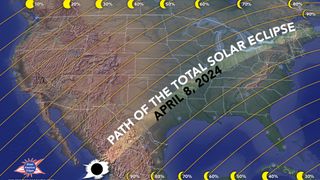
It's finally here: Today, (April 8) a total solar eclipse will pass across the skies North America, giving more than 33 million people living in 15 U.S. states a rare view of the totally-obstructed sun, and — weather permitting — a taste of some seriously strange eclipse phenomena .
If you’re wondering where the total and partial phases of the eclipse will be visible, the good news is that almost everyone in the contiguous U.S. will be able to see the celestial spectacle to some extent. But for a more detailed view of the eclipse’s path, take a look at these handy eclipse maps, courtesy of GreatAmericanEclipse.com.
Solar eclipse 2024 path of totality map
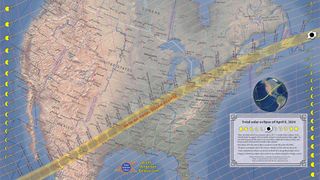
Totality is the moment that every eclipse-chaser lives for: The moment when the moon completely covers the sun’s face, resulting in a brief but eerie darkness in the daytime. The path of totality , shown in the map above, is the path of the moon’s shadow across Earth’s surface.
On Monday (April 8), totality will begin in Sinaloa, Mexico, then move northeast up to Texas, ultimately crossing 15 states before moving on to Canada. The states where totality will be visible are: Texas, Oklahoma, Arkansas, Missouri, Kentucky, Tennessee, Illinois, Indiana, Ohio, Michigan, Pennsylvania, New York, Vermont, New Hampshire and Maine — although Tennessee and Michigan will only be glanced by the moon's shadow.
Related: April 8 solar eclipse: What time does totality start in every state?
Viewers MUST be within the path of totality to witness the total phase of the eclipse; if you are off the path by even a mile, you will only see a partial eclipse, and miss out on the spooky daytime darkness. Furthermore, the closer you are to the center of the path of totality, the longer totality will last for you — up to a maximum duration of 4 minutes, 27 seconds in Torreón, Mexico.
Note: Totality is the ONLY TIME when it is safe to view the sun without protective eyewear like certified solar eclipse glasses . You must protect your eyes during the entire partial phase of the eclipse, no matter where you are.
Sign up for the Live Science daily newsletter now
Get the world’s most fascinating discoveries delivered straight to your inbox.
Solar eclipse 2024 partial eclipse map

If you live in the U.S. and can’t make it to the path of totality, a partial eclipse still awaits you on April 8. The entire contiguous U.S. will have some view of the partial eclipse, ranging from 99% coverage of the sun just off the path of totality to about 15% coverage far to the northwest of the path.
The map above shows how much of the sun’s disk will be blocked from your location. Watching the partial phases of the eclipse — which last about an hour and 20 minutes before and after totality — means wearing protective eyewear at all times. Failure to do so could result in permanent eye damage, according to NASA .
If you want to experience the celestial spectacle but don’t have a pair of eclipse glasses handy, there are many other ways to safely enjoy the partial eclipse . These include making a homemade pinhole projector , using a pasta strainer to project the shadow of the moon onto the ground or watching one of the various eclipse live streams available.
2024 eclipse travel maps
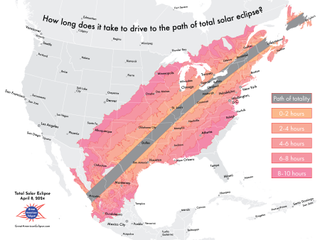
If you want to see totality but don’t live within the path, driving or taking public transit to a city within the path may be possible. The map above shows how far the drive is to the path of totality, based on where you’re coming from. Meanwhile, the map below shows the most populated cities within the path of totality — many of which are expected to be flooded with millions of eclipse tourists on April 8.
The biggest cities within the path of totality include: San Antonio, Dallas, Austin and Fort Worth in Texas; Indianapolis, Indiana; Hamilton and Montreal in Canada; and Torreón and Mazatlan in Mexico.
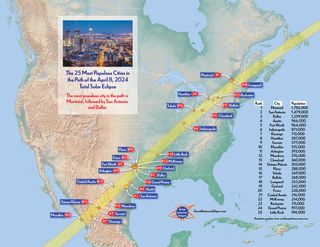
Wherever you are on April 8, we wish you clear skies and protected eyes during this rare, wondrous eclipse over North America.

Brandon is the space/physics editor at Live Science. His writing has appeared in The Washington Post, Reader's Digest, CBS.com, the Richard Dawkins Foundation website and other outlets. He holds a bachelor's degree in creative writing from the University of Arizona, with minors in journalism and media arts. He enjoys writing most about space, geoscience and the mysteries of the universe.
When is the next total solar eclipse after 2024 in North America?
Myth busted: Total solar eclipses don't release special, blinding radiation, NASA says
Pregnancy may speed up 'biological aging,' study suggests
Most Popular
By Sascha Pare April 08, 2024
By Andre Luiz Saraiva De Oliveira, Andrew Dzurak April 08, 2024
By Harry Baker April 08, 2024
By Kristina Killgrove April 08, 2024
By Tom Metcalfe April 07, 2024
By Nicoletta Lanese April 07, 2024
By Abha Jain April 07, 2024
By Jennifer Nalewicki April 07, 2024
By Jamie Carter April 06, 2024
By Melissa Hobson April 06, 2024
By Jennifer Nalewicki April 06, 2024
- 2 Watch live! The total solar eclipse has begun over North America.
- 3 April 8 solar eclipse: What time does totality start in every state?
- 4 Where to get solar eclipse glasses last minute
- 5 How and where to watch the April 8 solar eclipse online for free
- 2 Giant 'toe biter' water bugs discovered in Cyprus for the 1st time
- 3 When is the next total solar eclipse after 2024 in North America?
- 4 Watch live! The total solar eclipse has begun over North America.
- 5 8,200-year-old campsite of 'Paleo-Archaic' peoples discovered on US Air Force base in New Mexico

Countries, economies and regions
Select a country, economy or region to find embassies, country briefs, economic fact sheets, trade agreements, aid programs, information on sanctions and more.
International relations
Global security.
- Australia and sanctions
- Australian Safeguards and Non-proliferation Office (ASNO)
- Counter-terrorism
- Non-proliferation, disarmament and arms control
- Peacekeeping and peacebuilding
Regional architecture
- Asia Pacific Economic Cooperation (APEC)
- Association of Southeast Asian Nations (ASEAN)
- East Asia Summit (EAS)
- Australia and the Indian Ocean region
- Pacific Islands regional organisations
Global themes
- Child protection
- Climate change
- Cyber affairs and critical technology
- Disability Equity and Rights
- Gender equality
- Human rights
- Indigenous peoples
- People Smuggling, Human Trafficking and Modern Slavery
- Preventing Sexual Exploitation, Abuse and Harassment
- Australia’s treaty-making process
International organisations
- The Commonwealth of Nations
- United Nations (UN)
- World Trade Organization
Foreign Arrangements Scheme
Trade and investment, about free trade agreements (ftas).
- The benefits of FTAs
- How to get free trade agreement tariff cuts
- Look up FTA tariffs and services market access - DFAT FTA Portal
- Discussion paper on potential modernisation – DFAT FTA Portal
About foreign investment
- The benefits of foreign investment
- Investor-state dispute settlement (ISDS)
- Australia's bilateral investment treaties
- Australia's foreign investment policy
For Australian business
- Addressing non-tariff trade barriers
Expo 2025 Osaka, Kansai
Stakeholder engagement.
- Ministerial Council on Trade and Investment
- Trade 2040 Taskforce
- First Nations trade
Australia's free trade agreements (FTAs)
- ASEAN-Australia-New Zealand (AANZFTA)
- Chile (ACLFTA)
- China (ChAFTA)
- Hong Kong ( A-HKFTA & IA)
- India (AI-ECTA)
- Indonesia (IA-CEPA)
- Japan (JAEPA)
- Korea (KAFTA)
- Malaysia (MAFTA)
- New Zealand (ANZCERTA)
- Peru (PAFTA)
- Singapore (SAFTA)
- Thailand (TAFTA)
- United Kingdom (A-UKFTA)
- USA (AUSFTA)
- Trans-Pacific Partnership (TPP)
- European Union (A-EUFTA)
- India (AI-CECA)
- Australia-UAE Comprehensive Economic Partnership Agreement
- Australia-Gulf Cooperation Council (GCC)
Trade and investment data, information and publications
- Fact sheets for countries and regions
- Australia's trade balance
- Trade statistics
- Foreign investment statistics
- Trade and investment publications
- Australia's Trade through Time
WTO, G20, OECD, APEC and IPEF and ITAG
Services and digital trade.
- Service trade policy
- Australia-Singapore Digital Economy Agreement
- Digital trade & the digital economy
Development
Australia’s development program, performance assessment.
- Development evaluation
- Budget and statistical information
Who we work with
- Multilateral organisations
- Non-government organisations (NGOs)
- List of Australian accredited non-government organisations (NGOs)
Development topics
- Development issues
- Development sectors
2030 Agenda for Sustainable Development
- Sustainable Development Goals
Where we deliver our Development Program
Humanitarian action.
Where and how Australia provides emergency assistance.
People-to-people
Australia awards.
- Australia Awards Scholarships
- Australia Awards Fellowships
New Colombo Plan
- Scholarship program
- Mobility program
Public diplomacy
- Australian Cultural Diplomacy Grants Program
- Australia now
- UK/Australia Season 2021-22
Foundations, councils and institutes
- Australia-ASEAN Council
- Australia-India Council
- Australia-Indonesia Institute
- Australia-Japan Foundation
- Australia-Korea Foundation
- Council for Australian-Arab Relations (CAAR)
- Council on Australia Latin America Relations (COALAR)
International Labour Mobility
- Pacific Labour Mobility Scheme
- Agriculture Visa
Australian Volunteers Program
Supporting organisations in developing countries by matching them with skilled Australians.
Sports diplomacy
Australia is a successful global leader and innovator in sport.
A global platform for achievement, innovation, collaboration, and cooperation
About Australia
Australia is a stable, democratic and culturally diverse nation with a highly skilled workforce and one of the strongest performing economies in the world.
Australia in Brief publication
This is the 52nd edition of Australia in Brief, revised and updated in February 2021
Travel advice
To help Australians avoid difficulties overseas, we maintain travel advisories for more than 170 destinations.
- Smartraveller – travel advice
International COVID-19 Vaccination Certificate
Prove your COVID-19 vaccinations when you travel overseas.
- Services Australia
The Australian Passport Office and its agents are committed to providing a secure, efficient and responsive passport service for Australia.
- Australian Passport Office
24-hour consular emergency helpline
- Within Australia: 1300 555 135
- Outside Australia: +61 2 6261 3305
- Getting help overseas
- Visas for Australians travelling overseas
- Visas to visit Australia
Visit to China

IMAGES
VIDEO
COMMENTS
Subscribe to get updates on our travel advice for China. ... Contact Optus customer service directly on 133 937 (within Australia), or +612 8082 5678 (International), or go to their Passport Information (link is external) webpage. Go to our Frequently Asked Questions on the Optus data breach and passport information;
Australia is to introduce COVID-19 test requirements for arrivals from China — after skyrocketing COVID-19 case numbers — joining a range of other countries, including the United Kingdom, the ...
Flights between China and Australia have increased but are less frequent than pre-COVID-19. China has implemented random COVID-19 testing for inbound travellers arriving at airports. Authorities have advised that no follow-up action will be taken if travellers test positive on arrival, but they may be advised to seek medical treatment.
This measure is in response to the significant wave of COVID-19 infections in China and the potential for emerging viral variants in that country. From 12:01am on Thursday 5 January 2023, travellers will be required to undertake a COVID-19 test within the 48hrs prior to travel and show evidence of a negative test result when travelling to ...
From last Thursday, all travellers from China — including Australian citizens — have to take a pre-departure COVID-19 test and provide a negative result before heading to Australia. The new ...
The Australian health minister, Mark Butler, announced on Sunday that travellers from China would need to take a Covid test within the 48 hours before travel and show evidence of a negative result ...
Australia is making no change to its rules around allowing travellers from China into the country, despite measures by some countries to require mandatory COVID-19 tests, Australian Prime Minister ...
As COVID-19 cases in China surge and countries, including Australia, impose new travel rules, Chinese Australians are weighing up whether to visit relatives and loved ones.
Australia's top medical officer advised the government against imposing any restrictions on travelers coming from China, a day before the health minister announced new testing requirements ...
Australia's chief medical officer, Prof Paul Kelly, labelled any restriction on travel from China 'disproportionate to the risk'. Photograph: Mark Evans/Getty Images View image in fullscreen
Starting today, Australia will deny entry to all travelers coming from or having transited through mainland China, said Australian Prime Minister Scott Morrison.
Travel Advice. Information about possible risks overseas are contained in the Department's travel advisories. These and other travel tips to help you better prepare for your overseas trip can be found on the Smartraveller website www.smartraveller.gov.au. Click on the following links to view the latest travel advisories on: China Other countries You can also subscribe to automatically receive ...
Find continuously updated travel restrictions for China such as border, vaccination, COVID-19 testing, and quarantine requirements. ... Can I travel to China from Australia? Most visitors from Australia, regardless of vaccination status, can enter China.
Australia's health minister on Sunday cited Beijing's "lack of comprehensive information" about Covid-19 cases as the reasoning behind the travel requirement, which will take effect on January 5. The move will "safeguard Australia from the risk of potential new emerging variants," he said. In recent days, Canada, the US, UK, France, Italy ...
Although Australia's decision to issue a travel warning for China is an important recognition and pushback against Beijing's behavior, it is also still a victory of sorts for Beijing.
Traveling from Australia to China is possible, but it requires planning and preparation. The two countries have different visa requirements, and travel restrictions may be in place due to the ongoing COVID-19 pandemic. Visa requirements for China vary depending on the purpose of your trip and your nationality. Tourist visas are typically valid for 30
Rome2Rio makes travelling from Australia to China easy. Rome2Rio is a door-to-door travel information and booking engine, helping you get to and from any location in the world. Find all the transport options for your trip from Australia to China right here.
VIDEO. : Australia introduces travel restrictions for travellers from China. Posted Sun 1 Jan 2023 at 12:45am. Watch. 2m 18s. Passengers will now be required to present a negative COVID test to ...
November 17, 2023. Credit: Facebook / Anthony Albanese. Earlier this month, Australian Prime Minister Anthony Albanese met with Chinese President Xi Jinping in Beijing, signaling a long-awaited ...
The protection and safety of Australians is our highest priority. The National Security Committee of Cabinet has today decided that the continuing coronavirus infections in mainland China make it necessary to continue the travel restrictions on foreign nationals entering Australia for a further week to 29 February.
Australian citizens must obtain a visa before entry into China. Reach China embassy or consulate for the instructions how to apply the visa. Updated: 04/02/2024. Entry requirements. visa required.
The analysis by the Australia-China Relations Institute at the University of Technology in Sydney shows there were 15 Australia-China collaborations in 2024, compared with 26 in 2023, 23 in 2022 ...
The Australia-China trade war is an ongoing trade war between Australia and China. The exact date of when the trade war began is debated, however it is understood it began in either 2017 or 2018. 2010s. Tensions between China and the Western world increased in the mid-2010s.
Qantas has opened a quickfire three-day sale on 100 domestic routes a day after a new offering for high-rolling frequent flyers. From Tuesday until Friday, people can book one-way tickets on one ...
National Foundation for Australia China Relations. The National Foundation for Australia-China Relations is an Australian Government initiative established in 2020 to strengthen understanding and engagement between Australia and China. For more information about the Foundation and its competitive grant round go to australiachinafoundation.org.au.
A round trip from Australia to China can be purchased from upwards of $500, depending on peak travel times. Comparing different airlines and seasons of travel is the best method when trying to find the best price. Try to also book your Chinese holiday in advance so you can add on even more savings.
A total solar eclipse occurs when the moon passes between Earth and the sun, completely blocking the sun's face. Those within the path of totality will see a total solar eclipse. People outside ...
The path of totality, shown in the map above, is the path of the moon's shadow across Earth's surface. On Monday (April 8), totality will begin in Sinaloa, Mexico, then move northeast up to ...
Travel advice. To help Australians avoid difficulties overseas, we maintain travel advisories for more than 170 destinations. Smartraveller - travel advice; International COVID-19 Vaccination Certificate. Prove your COVID-19 vaccinations when you travel overseas. Services Australia
Our list of the 10 most beautiful places in the world is subjective, but we think it is eclectic enough to capture the diverse beauty of our planet. If you were to point a camera at any of the ...